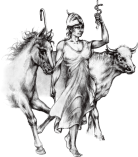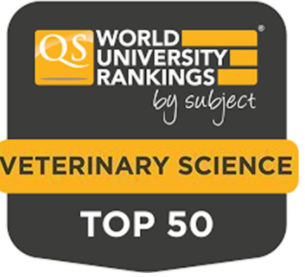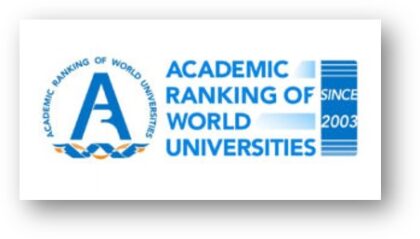Welcome to the School of Veterinary Medicine and Animal Science (FMVZ) at the University of São Paulo (USP). We are proud to be ranked amongst the top 50 institutions worldwide in the field of Veterinary Medicine according to QS World University Rankings, Times Higher Education, and Academic Rankings World Universities.
The University of São Paulo is a public university supported by the State of São Paulo and affiliated with the State Secretariat of Economic, Scientific, and Technological Development. Various global rankings, designed to assess university quality based on diverse criteria, particularly those related to scientific productivity, have consistently acknowledged the talent and dedication of USP professors, students, and staff.
International enrollment
Contact our International Office
+55 11 2648-1554
+55 11 3091-9954
ccint-fmvz@usp.br
About us
Presentation
In 2018, the School of Veterinary Medicine and Animal Science at the University of São Paulo (FMVZ-USP) commenced the celebration of the centenary of the establishment of the Veterinary Medicine course in the State of São Paulo, Brazil, as well as the 85th anniversary of the founding of FMVZ-USP in 1934. These significant milestones took place in 2019.
To mark this milestone, the School launched a two-year-long series of programs and activities to recover its history, starting with the creation of the Butantã Institute in 1917. It then progressed to become a College of Veterinary, offering a three-year course in 1919, and subsequently transitioning to a four-year course as a College of Veterinary Medicine in 1928.
In 1934, the University of São Paulo was founded as a higher education institution with eight Schools. Consequently, the School of Veterinary Medicine (FMV) was invited to join USP, becoming one of these eight pioneering institutions that created it .
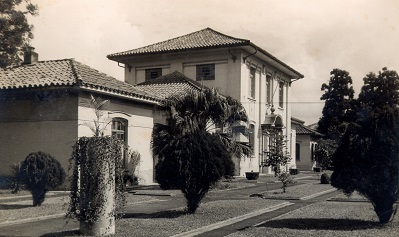
Facilities of School of Veterinary Medicine at Rua Pires da Mota, nº159In 1957, the Governor of the State, Jânio da Silva Quadros, in response to a demand from the FMVZ-USP Board , decided to expand its rural areas and permit better teaching facilities for animal husbandry and production. This was achieved by transferring the Institute of Animal Science and Livestock Industries (IZIP) from Pirassununga city to FMV-USP, opening up countless possibilities to enhance the existing teaching structure. As a result, in 1959, the School of Veterinary Medicine added Animal Science (Zootecnia) to its name, and became known as FMVZ-USP.
In 1965, FMVZ-USP launched its first postgraduate course in Animal Reproduction, which was one of the first to be created in Brazil. Although it had already been structured since the 1940s, the Veterinary Teaching Hospital (HOVET) was inaugurated and restructured in 1981. Over the years, new specialized services were created in various areas, contributing to an increase in the number of cases attended.
In 1978, the FMVZ-USP Board decided to launch a second higher education course in Animal Science, which was held until 1992 when it turned into a new School of USP, named the School of Animal Science and Food Engineering (FZEA). In 1990, USP created the Pirassununga Campus, while keeping the facilities of FMVZ-USP.
In 1988, USP created four Provosts: Graduation, Postgraduation, Research, and Culture and Outreach, thus decentralizing and specializing the structure. A similar structure was implemented in the Schools, called statutory Committees. Regarding graduation, it represented a great advance, as the most varied internal decisions (i.e., curriculum, pedagogical policy) always responding to Schools’ Board could be made separately. The Graduation Commission (CG) of FMVZ-USP is composed of faculties from each of its six departments and a student. From these six faculty members, one is elected as President and another one as a Course Coordinator.
This change brought greater agility to FMVZ-USP in planning and implementing improvements, managing Graduate and Postgraduate Courses, and also in activities related to research and outreach services offered to the external community.
The Veterinary Medicine Course offered by FMVZ-USP underwent evaluation processes, such as the National Examinations of the Course (Provão) promoted by the Ministry of Education and Culture from 1997 to 2003, achieving the highest grades of excellence in all of them.
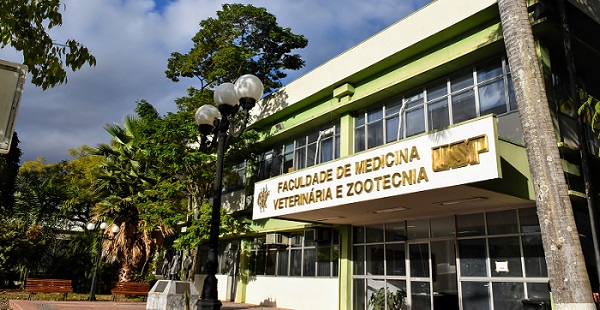
Current FMVZ-USP structure at São Paulo cityFrom 2015, FMVZ-USP has entered the select list of QS World University Rankings, one of the most important in the academic field, positioning itself between the Top 50 Schools of Veterinary Science, ranking 36th in 2015 and 38th in both 2016 and 2017, and again 36th in 2018. Being the best classification among all the Latin American Schools and the 2th one in Iberoamerica, behind only the University of Barcelona in Spain.
Dean’s Office
Prof. Dr. José Antonio Visintin
Dean
Prof. Dr. Marcos Veiga dos Santos
Vice Dean
Cátia Silene do Carmo Pimenta
Thais Soto Longarço
Staff
Contact information
+55 11 3091-7678
+55 11 3091-7672
fmvz@usp.br
Departments
FMVZ organizes its teaching and research activities in six departments in the USP campuses of the Capital and Pirassununga. They are subdivided into laboratories and services where undergraduate and postgraduate courses are offered, research projects are developed, and various activities such as refresher courses, specialization programs, and professional practices take place.
The Animal Reproduction (VRA) department develops teaching, research, and university extension activities that aim to improve the reproductive efficiency and conservation of various species. The department focuses on areas such as management, physiology, biotechnology, pathology, and obstetrics of both domestic and wild animals.
The Internal Medicine (VCM) department specializes in canine, feline, bovine, equine, caprine, ovine, and avian species. It encompasses studies in various areas, including cardiology, dermatology, hematology, nephrology, neonatology, pneumology, stress physiology, locomotor and digestive system disorders, mammary gland diseases, oncology, and nutritional and metabolic diseases of cattle and birds.
The Nutrition and Animal Production (VNP) department conducts scientific and technological research in the areas of nutrition and production across various animal species. It also collaborates with related fields. Additionally, the department provides scientific collaboration in research, teaching, and university extension to public and private agencies in Brazil and abroad.
The Pathology (VPT) department focuses on studying the causes and consequences of infectious, neoplastic, and poisoning diseases in domestic and wild animals. It also conducts research and maintenance of animals kept under laboratory conditions.
The objective of the Preventive Veterinary Medicine and Animal Health (VPS) department is to develop training, research, and extension activities aimed at addressing national issues related to Animal Health, Veterinary Public Health, and Food Hygiene.
The Surgery (VCI) department engages in activities across four major areas: Anatomy, Anesthesiology, Surgery, and Diagnostic Imaging. It offers university extension courses and operates through five specialized services at the Veterinary Hospital (Hovet). The department actively participates in the Veterinary Residency Program.
Teaching
Undergraduate
Veterinary Medicine
Duration: 10 semesters – full time
Vacancies: 80 per year
Tuition fees: free of charge
The pedagogical project of the Veterinary Medicine Course at FMVZ-USP provides a detailed plan for teaching and learning procedures necessary for professional qualification. It aims to equip students with a wide range of knowledge that enables them to work in the four dimensions of veterinary medicine, including pets, production, wild animals, public health, and their implications on animal food and environmental well-being.
The Veterinary Medicine Course offers its graduates a professional profile with a generalist, humanistic, critical, and reflective background. They are capable of understanding and addressing the needs of individuals, social groups, and communities related to professional practices within their specific fields of action in animal health and veterinary clinics, environmental sanitation, preventive veterinary medicine, public health, technology inspection of animal products, animal science, animal production and reproduction, ecology, environmental protection, as well as having knowledge of social, cultural, political, economic, agricultural, and agroindustrial administration. Graduates possess the capacity for logical reasoning, observation, interpretation, and analysis of data and information, as well as essential knowledge of Veterinary Medicine for problem identification and resolution.
Besides meeting official recommendations for academic content, the FMVZ-USP Veterinary Medicine Course aims to:
- Stimulate students to explore areas of knowledge within and beyond the school to enrich their training.
- Encourage students to seek knowledge from sources beyond those available in the school.
- Foster integration between knowledge areas to minimize compartmentalization of learning and promote interdisciplinary approaches.
- Maintain the generalist profile of the course while adapting to new demands.
The traditional teaching/learning program in Veterinary Medicine aims to cover the complete content of this evolving field of knowledge. However, the rapid economic and technological development experienced globally, including Brazil, has led to the creation of new areas of professional activity and demands, not only in Veterinary Medicine but across various sectors. These new demands require professionals with higher levels of specialization within established areas of knowledge.
The effectiveness of the traditional teaching/learning program has been questioned due to the evolving nature of Veterinary Medicine and the labor market’s increasing demand for specialized professionals who are versatile across different knowledge areas, including those outside the Veterinary Medicine field.
Therefore, FMVZ-USP has been updating its academic structure to meet these new demands, offering a course that combines compulsory subjects with flexibility for students to combine different areas of knowledge based on their needs. These changes provide students with more opportunities to interact with necessary and complementary fields of action and make use of the wide range of knowledge available at USP or in other academic sectors, allowing for a more dynamic and personalized learning experience. In this new program, students have free time during the week and more possibilities for non-compulsory activities.
With this approach, students have the power to shape their graduation experience in Veterinary Medicine, and the compartmentalization of knowledge is minimized through interdisciplinary courses that bring together competences from multiple areas. FMVZ-USP emphasizes that it does not aim to cover all areas of knowledge required for professional training, but rather shares the responsibility with students themselves. In general, approximately 15% of the course hours are allocated to activities chosen by students.
The learning/teaching structure of the FMVZ-USP Graduate Program is characterized by the combination of activities offered by several USP Teaching Schools. The development of the Veterinary Medicine Course is overseen by six departments of FMVZ-USP and nine departments of other USP Schools. Interdepartmental disciplines are also offered under the coordination of the CG of FMVZ-USP.
The Veterinary Medicine Course is conducted in person and ideally consists of 10 semesters. In the first three academic years, subjects in the basic knowledge areas are offered, such as Cytology, Histology, Anatomy, Biochemistry, Physiology, Microbiology, Parasitology, and Immunology. All these subjects are areas of knowledge required to build concepts for the understanding of biological functions at different levels: molecular, cellular, tissue, and organs. The Institute of Mathematics and Statistics (IME-USP), the Institute of Biomedical Sciences (ICB-USP), the Institute of Chemistry (IQ-USP), and the Institute of Biosciences (IB) collaborate with FMVZ-USP to offer this wide range of knowledge to FMVZ/USP students.
The interaction of FMVZ-USP students with other USP Schools provides an important opportunity to universalize knowledge, as the students interact with students from other courses, such as Medicine, Dentistry, Biology, among others.
In the 4th year, students begin to have contact with the applied learning/teaching structure core, where they have the opportunity to learn about work methods and other unique abilities of a Veterinarian.
In the 5th year, students spend a semester at FMVZ-USP Fernando Costa Campus in Pirassununga city (also in São Paulo State), where they can live in free student housing offered by USP to learn about Animal Production. During this semester, Animal Production teaching is complemented with subjects of Animal Reproduction, offered immediately before and immediately after this 5th semester, as this campus has dedicated infrastructure for this subject (e.g., poultry, stables, swine, slaughterhouse, dairy, feed mill, animal breeding laboratories, beef cattle production). Learning about animal species of production, their maintenance, reproduction, and health constitutes essential aspects for improving the performance of the meat and milk production chain. Therefore, it is necessary for this learning to take place in the rural environment provided by the Campus USP Fernando Costa. For this reason, this campus becomes essential for part of the 4th semester and for the 5th and 6th semesters.
Returning to USP São Paulo Campus during the 6th semester, students learn about Animal Reproduction and Preventive Veterinary Medicine. The 5th and 6th semesters are dedicated to contextualized teaching in the population approach.
In the 7th and 8th semesters, disciplines related to individual animal medicine are offered, mainly represented by the subject of Clinic and Surgery of Domestic Animals. At the USP São Paulo Campus, FMVZ-USP students have access to laboratories and hospital facilities for all disciplines that require these resources.
Throughout the course, in all the subjects taught in São Paulo, excursions are planned to the FMVZ-USP facilities at the USP Fernando Costa Campus to allow students to practice activities related to animal production. These excursions generally last one week and take place during disciplines related to the areas of Clinic, Surgery, Pathology, Animal Reproduction, and Preventive Veterinary Medicine, in order to provide an integrative overview of this knowledge.
At the end of the first 4 years, students begin the 9th semester when they must choose to attend at least one of ten elective subjects. Among these disciplines, the subject called Supervised Curricular Internship is offered, allowing them to seek an institution to practice the knowledge obtained during the graduation course. The Supervised Curricular Internship, with a workload of 480 hours, is the last activity/subject of the student’s graduation, held under the supervision of one of FMVZ-USP faculty members.
Finally, the teaching/learning structure, in addition to attending to legal aspects, guarantees a general education but also seeks to provide flexibility for the students. This is accomplished by offering elective courses and creating “free time” (non-compulsory activities), allowing students to seek knowledge and skills autonomously in areas of greater affinity within the field of Veterinary Medicine.
Postgraduate
In 1973, FMVZ USP was a pioneer in Brazil in offering a postgraduate course in Veterinary Medicine.
The FMVZ Graduate Program is a stricto sensu program of a more academic nature, aimed at training masters and doctors to meet the demand of the public and private sectors. The research conducted within the program addresses new problems and tests new theories. It encompasses a set of activities that are planned and supervised by an advisor. Students may have the opportunity to receive scholarships from development agencies.
Research
Brazilian Journal of Veterinary Research and Animal Science (BJVRAS)
The Brazilian Journal of Veterinary Research and Animal Science (BJVRAS) aims to publish full articles, preliminary notes, and review articles in the fields of veterinary medicine, animal science, and allied sciences. These articles can be prepared by national and/or foreign authors, provided they meet the editorial standards.
Digital Libraries
Intellectual Production of USP
The platform provides access to the scientific, academic, artistic, and technical production of researchers, as well as the theses and dissertations defended since 1985.
Theses and Dissertations
It offers the complete digital version of theses and dissertations defended in master’s and doctoral programs of the University.
Services to community
Veterinary Teaching Hospital
The Veterinary Teaching Hospital (HOVET) of FMVZ USP plays an important role in supporting teaching, research, and extension. Originally built in a less structured manner since the 1940s, it was inaugurated and restructured in 1981.
HOVET represents a crucial partnership between hospital care and undergraduate and postgraduate courses, specialization programs, as well as residency and professional improvement programs offered by the Faculty.
Currently, it is considered the largest university veterinary hospital in Latin America in terms of the number of cases treated, pioneering the provision of medical and surgical specialities in Brazil.
It brings together the services of all the Faculty’s departments, providing care in various areas for pets, livestock, equines, wildlife, exotics, and birds, with a focus on cases of educational and scientific interest.
Museum of Veterinary Anatomy
Officially established in 1984 and restructured in 2010, the Museum of Veterinary Anatomy Prof. Dr. Plínio Pinto e Silva (MAV) is an integral part of FMVZ USP.
Its mission is to develop research activities, teaching, and extension services to the community in different areas of Veterinary Medicine and Animal Science, with a particular emphasis on animal anatomy. Its long-term exhibition showcases approximately one thousand specimens prepared and preserved using various techniques by professors, staff, and students of FMVZ-USP over the years.
MAV is the first museum of USP and one of the first in Brazil to systematically provide high-resolution images of its collection for free on Wikipedia through an institutional partnership.
Currently, the Museum receives over 12,000 visitors annually, with approximately 75% consisting of school groups, which corresponds to an average of 250 schools per year.
